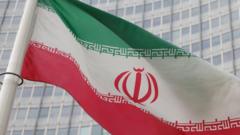Asif William Rahman, 34, pleaded guilty to violating national security laws by leaking classified information, which has raised serious concerns about the risks to American national security and the implications for U.S.-Israel relations.
CIA Analyst Sentenced to Over Three Years for Leaking Israel's Military Plans

CIA Analyst Sentenced to Over Three Years for Leaking Israel's Military Plans
A former CIA analyst has received a 37-month prison sentence for leaking sensitive documents related to Israel's military actions against Iran.
A 34-year-old former CIA analyst, Asif William Rahman, has been sentenced to 37 months in prison for leaking confidential information about Israel's military plans targeting Iran. In January 2024, Rahman admitted to two counts of willful retention and transmission of national defense information under the Espionage Act. His actions involved using his security clearance to print, photograph, and distribute top-secret documents, which eventually circulated on social media.
This leak occurred against the backdrop of heightened tensions between Israel and Iran. Following the leak, Israel conducted airstrikes on Iran in October 2024, aimed specifically at military installations after a series of missile launches from Tehran. John Eisenberg, assistant attorney general for national security, criticized Rahman for betraying his country and undermining the safety of the American public.
The leaked materials were reportedly shared on an Iranian-aligned Telegram account, and included sensitive assessments about Israeli military strategy and movements. Notably, one document touched upon Israel's unacknowledged nuclear capabilities, stoking further concern around the secrecy of U.S. intelligence matters.
Former President Joe Biden expressed "deep concern" regarding the personal and national security implications of the leak. Rahman, who had worked overseas, was apprehended by the FBI in Cambodia and transported to Guam to face legal proceedings. This case raises pertinent questions regarding the balance between national security and whistleblowing in the current geopolitical climate.





















